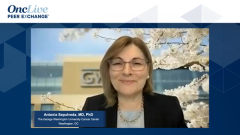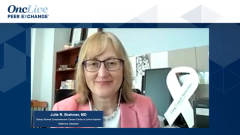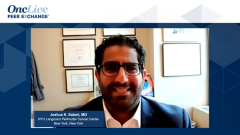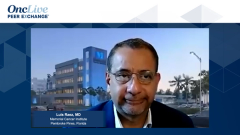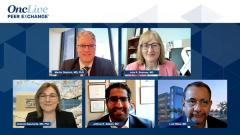
Approach to Treating Patients with NSCLC and RET Fusions
Experts on non–small cell lung cancer share their approaches to treating patients who have RET fusions and review updates on selpercatinib and pralsetinib.
Episodes in this series

Transcript:
Martin Dietrich, MD, PhD: Another of the rare fusions is RET for us. Dr Raez, you’ve been an investigator in RET for many, many years. Can you give us your thoughts on selpercatinib and the LIBRETTO-001 update?
Luis Raez, MD: Alex Drilon, MD, did an update recently in the [Journal of Clinical Oncology]. And because in the original LIBRETTO-001, I think we had around 140 something patients, now we have an update of more than 316. I think it’s always good to update because otherwise we get criticized years later that whenever we are taking a TKI [tyrosine kinase inhibitor] it is with a small number of patients. In this update, we have patients who were TKI naive, and they have an overall response rate of 80% and the PFS [progression-free survival] is like 22 months. We have patients that already [did not respond to] chemo, and they still respond to the RET inhibitor and selpercatinib. And this is still a 60% response rate, another 22 months of PFS. So the results are very good, is what we’re already seeing with these agents for the last 5 years. The toxicity is the most important thing also. Now that we have a large number of patients, we have a higher amount of security, because we know that the toxicities are not bad, they’re tolerable. In my institution, we have treated before the approval of selpercatinib probably like 13, 14 patients. A lot of them have hypertension, very easy to manage. We didn’t have to discontinue any of them because of hypertension. The rest of the toxicity, some mild peripheral paresthesia. Some things are very tolerable. So that’s why I think these are 2 great agents. Now I’m very glad that I have seen also publications in colon cancer and other cancer that are less frequent, but I think it’s very important.
Martin Dietrich, MD, PhD: Excellent. A difficult choice. Dr Sepulveda, pralsetinib, our second RET inhibitor in approval. Could you share your thoughts on the data that was published?
Antonia Sepulveda, MD, PhD: Absolutely. I was impressed by the fact that this study, which used pralsetinib, which is a selective RET inhibitor, it’s highly potent. It’s an oral agent, and it seems to have good central nervous system penetration. The update on this study showed robust efficacy and was generally well tolerated. The patients, as I mentioned earlier, they were treatment-naive patients. I believe there is a parallel study that’s ongoing looking at the results of pralsetinib compared with the standard of care to be used in the first-line setting. This seems like an exciting opportunity, but I’d be curious to hear what other oncology colleagues think about these results.
Martin Dietrich, MD, PhD: Dr Sabari, how do you choose? What are your thoughts?
Joshua K. Sabari, MD: I was trained by Alex Drilon, so it’s very hard. I use selpercatinib. It was approved first. I think the frontline data seem a little bit better. There is a difference between the twice-a-day dosing for selpercatinib and the daily dosing for pralsetinib. But I tend to use the drug I feel most comfortable with and know well, and that is selpercatinib in the frontline. Is there space for 2 therapies in this setting? Maybe. RET is a pretty rare alteration as well, about 1%. I have gone to pralsetinib in patients with toxicity. Recently I had a woman who had transaminitis related to the drug and did not improve with steroids. I was able to transition to pralsetinib and she tolerated it well. But again, 9 out of 10 times, I’m using selpercatinib in this setting.
Martin Dietrich, MD, PhD: It’s a fantastic drug. I agree. This is one of those progresses that we’ve really wanted to see.
Transcript is AI-generated and edited for clarity and readability.


